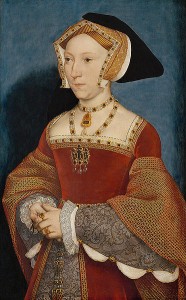 On this day in 1536, Whitsun, Henry VIII’s third wife, Jane Seymour, was proclaimed Queen at Greenwich. Chronicler Charles Wriothesley recorded this moment:
On this day in 1536, Whitsun, Henry VIII’s third wife, Jane Seymour, was proclaimed Queen at Greenwich. Chronicler Charles Wriothesley recorded this moment:
“Also the 4th daie of June, being Whitsoundaie, the said Jane Seymor was proclaymed Queene at Greenewych, and went in procession, after the King, with a great traine of ladies followinge after her, and also ofred at masse as Queen, and began her howsehold that daie, dyning in her chamber of presence under the cloath of estate.”1
England had a new queen.
Notes and Sources
- Wriothesley’s Chronicle, p43-44